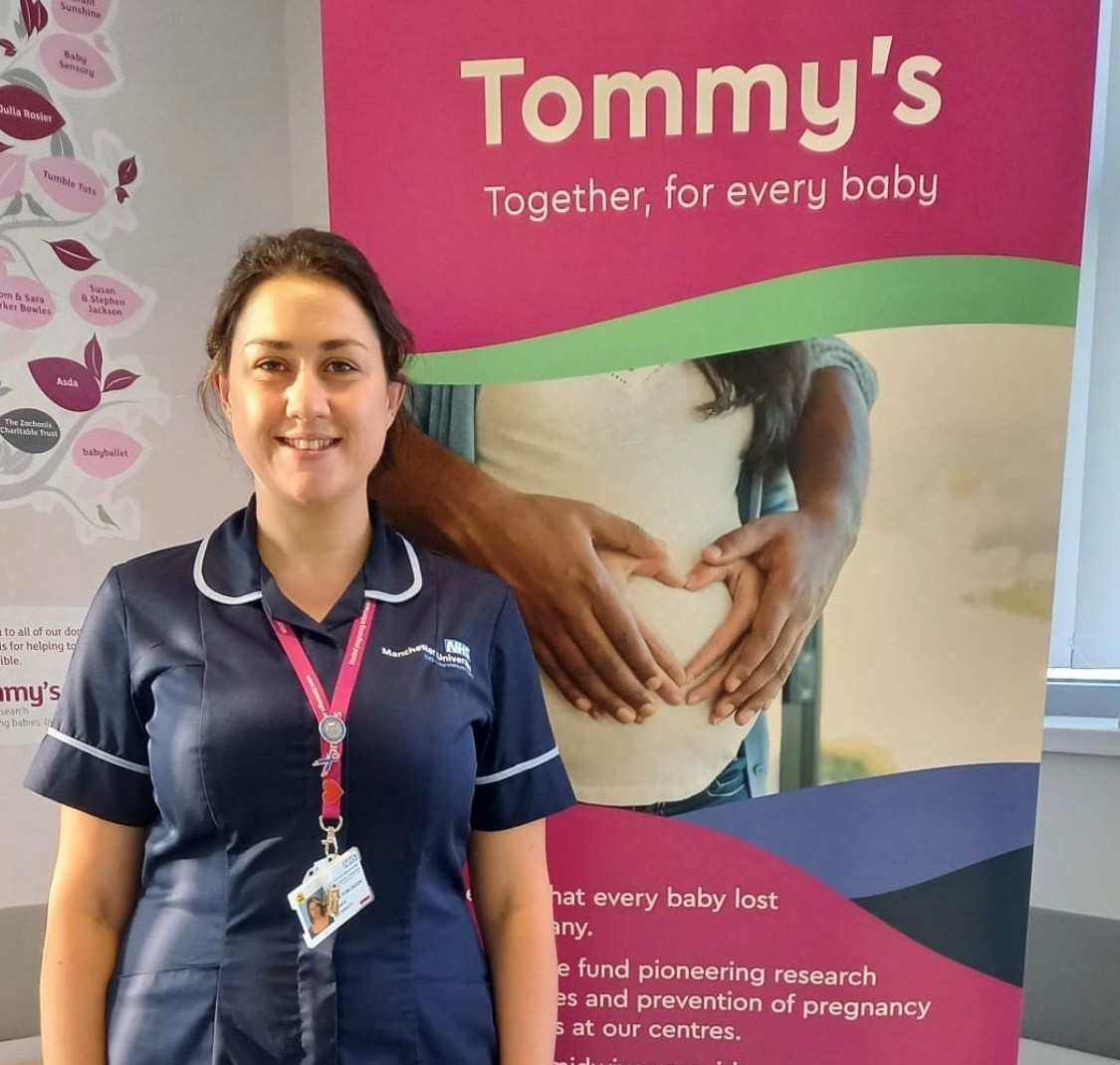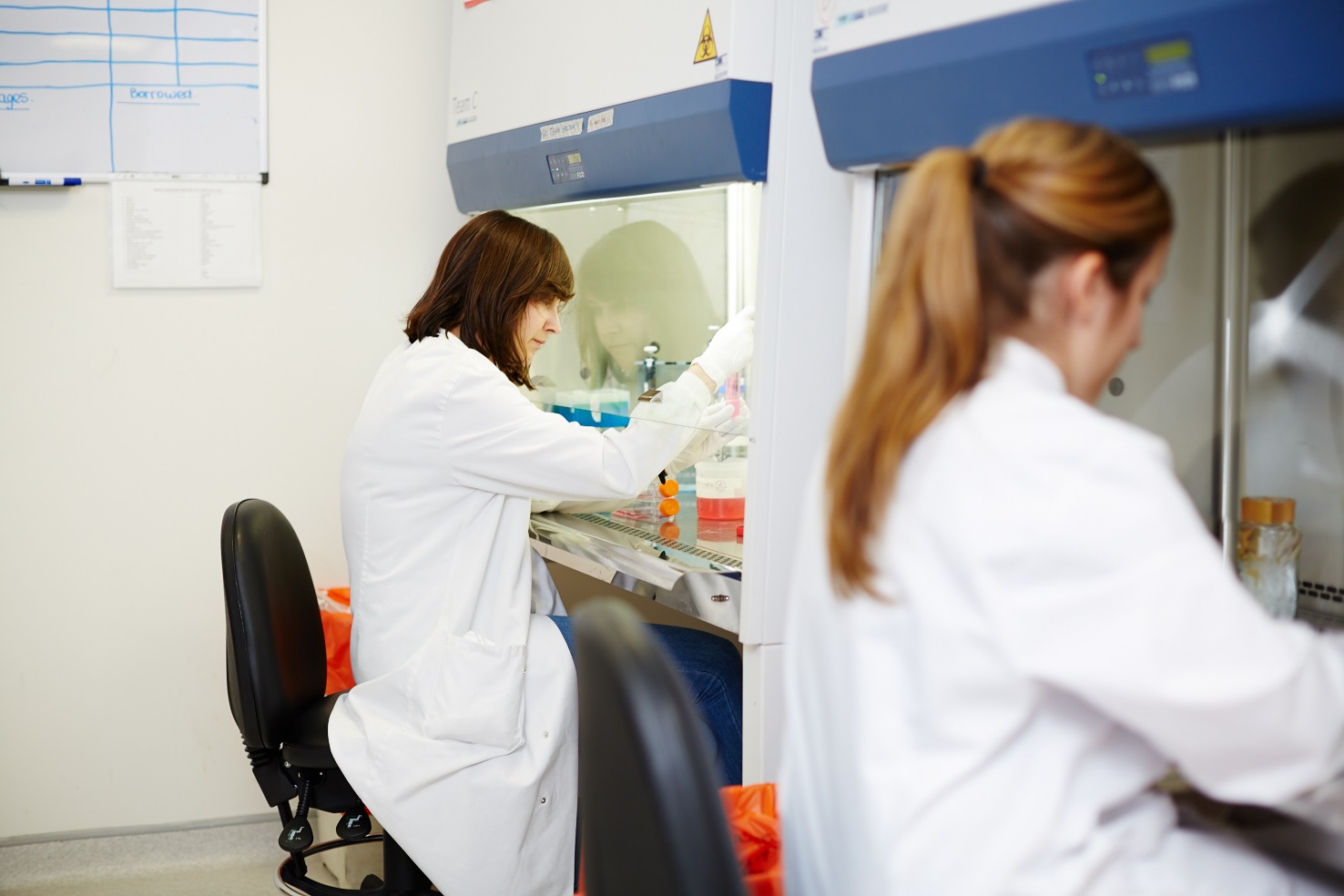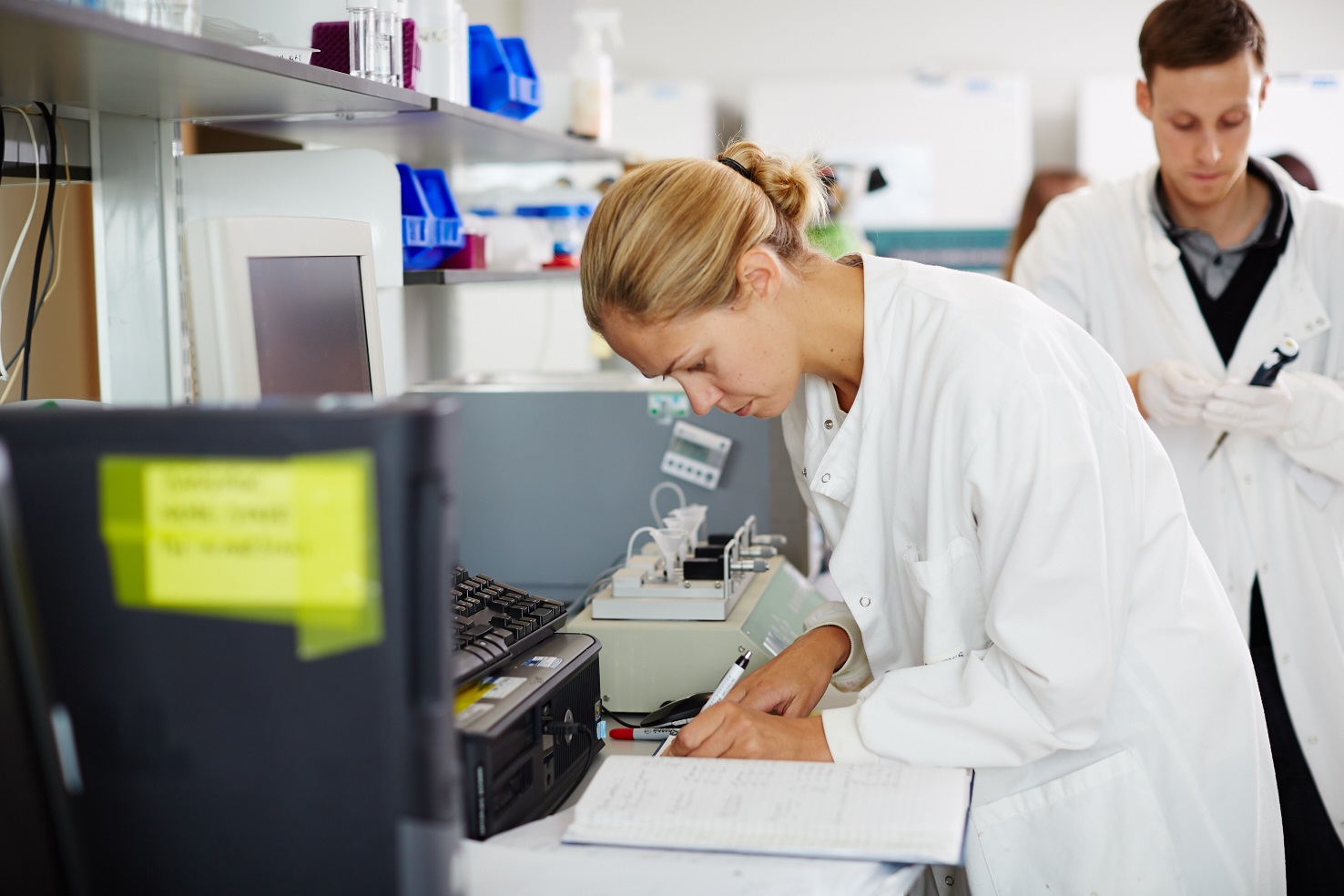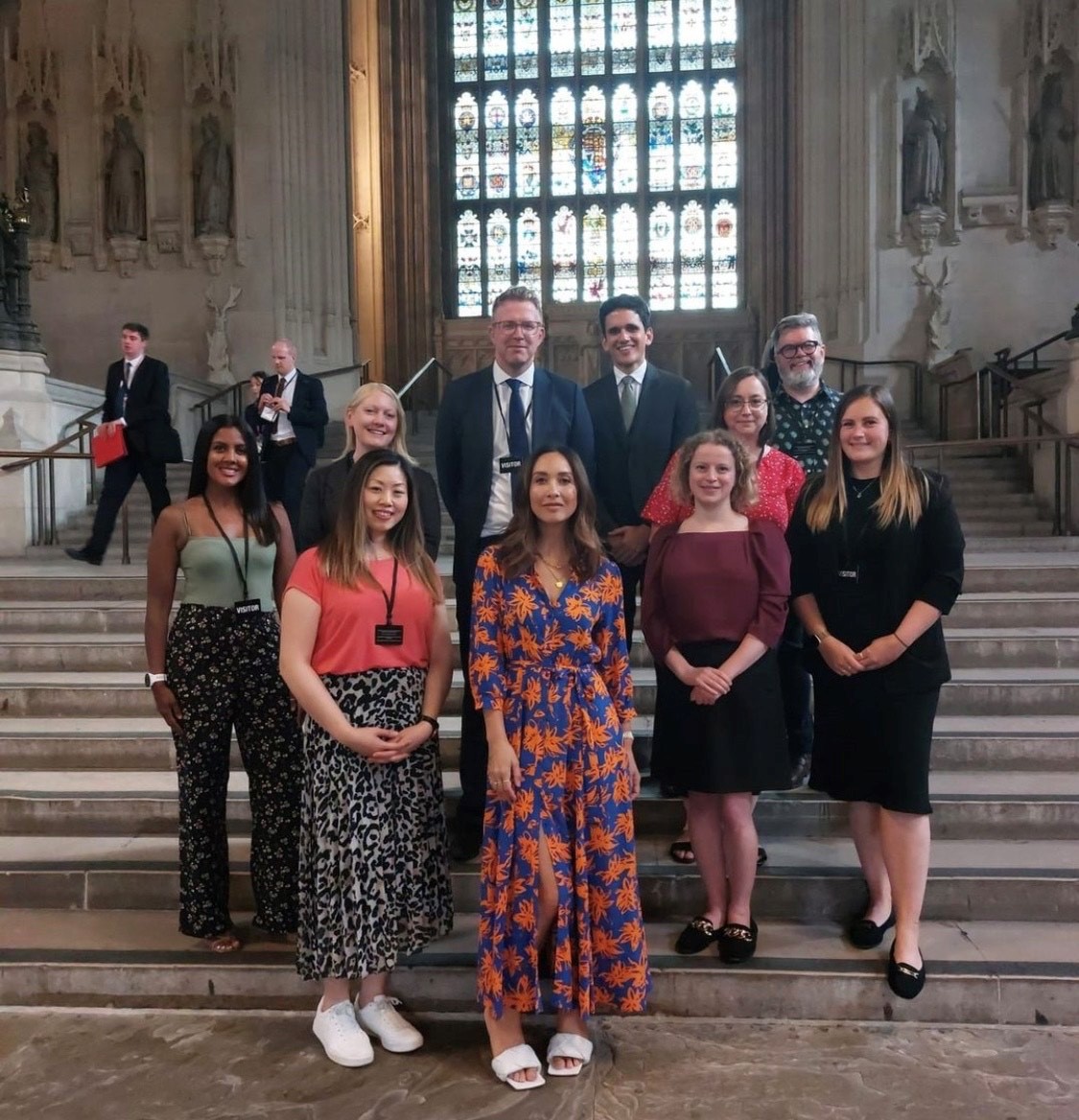

Our current research
Tommy's is funding many exciting research projects and clinical trials across the UK. We thought we'd share some of our ongoing research so you can learn a little more about where your fundraising could be making a difference.
We're creating the Tommy's Pathway
The Tommy's Pathway is a tool that's being designed right now. And your fundraising could over the next few years be helping to trial and roll out this tool across the country.
What is your fundraising supporting now?
Since the Tommy’s Pathway was launched in December 2021, it has been implemented at four maternity units across the UK. Staff at these sites are continuing to be supported to use the tool, and their feedback will help the research team understand how it can be implemented in different maternity units.
This year, the research team will run a 36-month trial across 26 maternity units in the UK to demonstrate the positive impact of the Tommy’s Pathway on pregnancy outcomes when compared to current care.
Our researchers have found a 4-fold improvement in accuracy of assessing risk using the Tommy’s Pathway compared to the current checklist.
We’re also looking into trialing the app internationally to see how it works in different economic and healthcare settings.
Thanks to your incredible fundraising, when the tool is rolled out nationally, it could help to prevent up to 600 stillbirths and 12,000 premature births a year.

Why is the Tommy's Pathway needed?
There is a vast difference in the quality of care given to pregnant people in different parts of the UK, as well as in the rates of stillbirth and premature birth. These differences are partly due to differences in how care guidelines are being followed locally and the availability of resources. This is leading to worsening health inequalities.
The way risk in pregnancy is currently assessed is outdated. A checklist, which has remained unchanged since the 1970s, does not allow healthcare providers to accurately measure how high or low someone’s risk of poorer pregnancy outcomes is. It is inaccurate and therefore can result in more resource being given to those who don’t need it, and less being given to those who do.
We also know that we have a healthcare system where some people, particularly those from minority ethnic backgrounds and more deprived communities, have poor pregnancy outcomes. This is unacceptable.

How will the Tommy's Pathway help to address these issues?
The Tommy’s Pathway uses AI algorithms to help midwives and doctors more accurately assess each woman and birthing person’s needs during pregnancy and personalise their care. Early in pregnancy, the tool can identify each person’s chance of preterm birth or of developing problems with the placenta which may lead to stillbirth.
The tool aims to create standardised and equitable care across the NHS and ensure that each person is offered the right care at the right time, no matter where they live. It will also empower pregnant women and birthing people to become more engaged in their own care.

What is your fundraising supporting now?
Since the Tommy’s Pathway was launched in December 2021, it has been implemented at four maternity units across the UK. Staff at these sites are continuing to be supported to use the tool, and their feedback will help the research team understand how it can be implemented in different maternity units.
This year, the research team will run a 36-month trial across 26 maternity units in the UK to demonstrate the positive impact of the Tommy’s Pathway on pregnancy outcomes when compared to current care.
Our researchers have found a 4-fold improvement in accuracy of assessing risk using the Tommy’s Pathway compared to the current checklist.
We’re also looking into trialing the app internationally to see how it works in different economic and healthcare settings.
Thanks to your incredible fundraising, when the tool is rolled out nationally, it could help to prevent up to 600 stillbirths and 12,000 premature births a year.

Why is the Tommy's Pathway needed?
There is a vast difference in the quality of care given to pregnant people in different parts of the UK, as well as in the rates of stillbirth and premature birth. These differences are partly due to differences in how care guidelines are being followed locally and the availability of resources. This is leading to worsening health inequalities.
The way risk in pregnancy is currently assessed is outdated. A checklist, which has remained unchanged since the 1970s, does not allow healthcare providers to accurately measure how high or low someone’s risk of poorer pregnancy outcomes is. It is inaccurate and therefore can result in more resource being given to those who don’t need it, and less being given to those who do.
We also know that we have a healthcare system where some people, particularly those from minority ethnic backgrounds and more deprived communities, have poor pregnancy outcomes. This is unacceptable.

How will the Tommy's Pathway help to address these issues?
The Tommy’s Pathway uses AI algorithms to help midwives and doctors more accurately assess each woman and birthing person’s needs during pregnancy and personalise their care. Early in pregnancy, the tool can identify each person’s chance of preterm birth or of developing problems with the placenta which may lead to stillbirth.
The tool aims to create standardised and equitable care across the NHS and ensure that each person is offered the right care at the right time, no matter where they live. It will also empower pregnant women and birthing people to become more engaged in their own care.

What is your fundraising supporting now?
Since the Tommy’s Pathway was launched in December 2021, it has been implemented at four maternity units across the UK. Staff at these sites are continuing to be supported to use the tool, and their feedback will help the research team understand how it can be implemented in different maternity units.
This year, the research team will run a 36-month trial across 26 maternity units in the UK to demonstrate the positive impact of the Tommy’s Pathway on pregnancy outcomes when compared to current care.
Our researchers have found a 4-fold improvement in accuracy of assessing risk using the Tommy’s Pathway compared to the current checklist.
We’re also looking into trialing the app internationally to see how it works in different economic and healthcare settings.
Thanks to your incredible fundraising, when the tool is rolled out nationally, it could help to prevent up to 600 stillbirths and 12,000 premature births a year.

What is your fundraising helping Tommy's to find out now?
We're now researching whether a new treatment can correct the imbalance in vaginal bacteria and reduce the chance of miscarriage.
Data has shown that giving a pessary containing the right bacteria does increase the amount of that bacteria in the vagina, so this could be a strategy to prevent miscarriage.
If we can better understand the relationship between the vaginal microbiome and the risk of miscarriage, we can develop bed side tests which could help identify women and birthing people who are more vulnerable to these imbalances much sooner. They can then benefit from treatments that aren't possible later in pregnancy.
Our team are working on a quick bedside test for the vaginal microbiome and hope this will be a huge step forward in understand and preventing miscarriage.

Vaginal microbiome research
Why is this research needed?
1 in 4 pregnancies end in loss and many parents never find out why. Around half of early miscarriages happen because of chromosomal abnormalities in the baby, but in the rest, something else must be going on. Our researchers want to understand how the environment in the vagina might be leading to miscarriage.

What do Tommy's know so far?
The vaginal microbiome is the environment of micro-organisms that live inside the vagina.
In a healthy vagina, there is a large amount of a particular bacteria.
Our researchers have found that a vaginal environment with a low amount of this bacteria is connected to increased inflammation and a higher risk of miscarriage.

What is your fundraising helping Tommy's to find out now?
We're now researching whether a new treatment can correct the imbalance in vaginal bacteria and reduce the chance of miscarriage.
Data has shown that giving a pessary containing the right bacteria does increase the amount of that bacteria in the vagina, so this could be a strategy to prevent miscarriage.
If we can better understand the relationship between the vaginal microbiome and the risk of miscarriage, we can develop bed side tests which could help identify women and birthing people who are more vulnerable to these imbalances much sooner. They can then benefit from treatments that aren't possible later in pregnancy.
Our team are working on a quick bedside test for the vaginal microbiome and hope this will be a huge step forward in understand and preventing miscarriage.

Vaginal microbiome research
Why is this research needed?
1 in 4 pregnancies end in loss and many parents never find out why. Around half of early miscarriages happen because of chromosomal abnormalities in the baby, but in the rest, something else must be going on. Our researchers want to understand how the environment in the vagina might be leading to miscarriage.

What do Tommy's know so far?
The vaginal microbiome is the environment of micro-organisms that live inside the vagina.
In a healthy vagina, there is a large amount of a particular bacteria.
Our researchers have found that a vaginal environment with a low amount of this bacteria is connected to increased inflammation and a higher risk of miscarriage.

What is your fundraising helping Tommy's to find out now?
We're now researching whether a new treatment can correct the imbalance in vaginal bacteria and reduce the chance of miscarriage.
Data has shown that giving a pessary containing the right bacteria does increase the amount of that bacteria in the vagina, so this could be a strategy to prevent miscarriage.
If we can better understand the relationship between the vaginal microbiome and the risk of miscarriage, we can develop bed side tests which could help identify women and birthing people who are more vulnerable to these imbalances much sooner. They can then benefit from treatments that aren't possible later in pregnancy.
Our team are working on a quick bedside test for the vaginal microbiome and hope this will be a huge step forward in understand and preventing miscarriage.

What is your fundraising helping us do next?
Our researchers think that a combination of drugs that reduce inflammation and drugs that reduce blood clots should be given as standard to all women and birthing people with a history of CHI.
These recommendations are being used to create new CHI clinical guidelines, and our researchers often advise clinicians across the country on the best way to treat their patients with CHI.
Our researchers are also trying to reduce the variation in diagnosis of CHI by using software that can more accurately identify changes in the placenta caused by it. This will also help them find out which treatments are most effective.

Research into preventing and treating Chronic Histiocytic Intervillositis (CHI)
What has our research taught us so far?
CHI is a rare condition in which the immune system reacts abnormally during pregnancy, damaging the placenta. This can cause inflammation and blood clots in the placenta, and prevent the baby from growing properly. In severe cases, it can potentially lead to stillbirth or miscarriage.
In women with a history of CHI, research has shown that treatment with drugs that reduce inflammation made CHI less severe and live birth 25% more likely, compared with just using drugs that reduce blood clotting or no treatment at all.

What is your fundraising helping us do next?
Our researchers think that a combination of drugs that reduce inflammation and drugs that reduce blood clots should be given as standard to all women and birthing people with a history of CHI.
These recommendations are being used to create new CHI clinical guidelines, and our researchers often advise clinicians across the country on the best way to treat their patients with CHI.
Our researchers are also trying to reduce the variation in diagnosis of CHI by using software that can more accurately identify changes in the placenta caused by it. This will also help them find out which treatments are most effective.

Research into preventing and treating Chronic Histiocytic Intervillositis (CHI)
What has our research taught us so far?
CHI is a rare condition in which the immune system reacts abnormally during pregnancy, damaging the placenta. This can cause inflammation and blood clots in the placenta, and prevent the baby from growing properly. In severe cases, it can potentially lead to stillbirth or miscarriage.
In women with a history of CHI, research has shown that treatment with drugs that reduce inflammation made CHI less severe and live birth 25% more likely, compared with just using drugs that reduce blood clotting or no treatment at all.

What is your fundraising helping us do next?
Our researchers think that a combination of drugs that reduce inflammation and drugs that reduce blood clots should be given as standard to all women and birthing people with a history of CHI.
These recommendations are being used to create new CHI clinical guidelines, and our researchers often advise clinicians across the country on the best way to treat their patients with CHI.
Our researchers are also trying to reduce the variation in diagnosis of CHI by using software that can more accurately identify changes in the placenta caused by it. This will also help them find out which treatments are most effective.

Our ongoing campaigns
What is your fundraising supporting now?
The Women's Health Strategy was published in summer 2022 and fell short of the Government's pledges.
We're now working tirelessly to hold the Government to account on their promises and to make sure good miscarriage care is available to all.
With your support, these recommendations will soon become standard practice across the UK.

What have we campaigned for so far?
Over the last year we've been campaigning the government for 5 key improvements in miscarriage care:
1. Support should be available after every miscarriage, not just after 3.
2. Mental health support should be available after each loss.
3. An end to the postcode lottery: tests and treatments must be standardised across the UK.
4. Higher risk women must get better care from the start.
5. All miscarriages must be recorded, so we understand the scale of the problem.

What happened next?
Over 6700 people emailed their MP/MSP to demand action
Over 250,000 people have signed our petition
Olivia Blake MP raised our petition in parliament.
In response, the Health Minister announced our recommendations would be put forward for inclusion in the Women's Health Strategy

What is your fundraising supporting now?
The Women's Health Strategy was published in summer 2022 and fell short of the Government's pledges.
We're now working tirelessly to hold the Government to account on their promises and to make sure good miscarriage care is available to all.
With your support, these recommendations will soon become standard practice across the UK.

What have we campaigned for so far?
Over the last year we've been campaigning the government for 5 key improvements in miscarriage care:
1. Support should be available after every miscarriage, not just after 3.
2. Mental health support should be available after each loss.
3. An end to the postcode lottery: tests and treatments must be standardised across the UK.
4. Higher risk women must get better care from the start.
5. All miscarriages must be recorded, so we understand the scale of the problem.

What happened next?
Over 6700 people emailed their MP/MSP to demand action
Over 250,000 people have signed our petition
Olivia Blake MP raised our petition in parliament.
In response, the Health Minister announced our recommendations would be put forward for inclusion in the Women's Health Strategy

What is your fundraising supporting now?
The Women's Health Strategy was published in summer 2022 and fell short of the Government's pledges.
We're now working tirelessly to hold the Government to account on their promises and to make sure good miscarriage care is available to all.
With your support, these recommendations will soon become standard practice across the UK.

